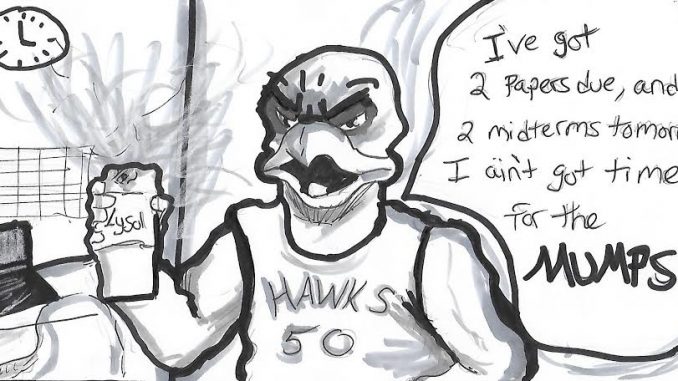
In the midst of flu season, the SUNY New Paltz community has been notified of one student being diagnosed with the mumps virus by the Student Health Center.
“Mumps is caused by a respiratory virus whose symptoms include painful swelling of the salivary glands near the ears and under the jaw, which can occur on one or both sides of the face. This swelling may be associated with other nonspecific symptoms,” according to Student Health Services.
We at The New Paltz Oracle encourage students to go to the doctor if they show symptoms of mumps, and to stay clear of social interaction. The Center for Disease Control, (CDC), and Prevention say that those who are infected with mumps do not get sick right away—it can take two to four weeks to show signs of infection.
Last week, Student Health Services Director Dr. Jack Ordway, M.D. sent the first of three emails alerting students of the potential medical nuisance.
On Oct. 7, the first email alert was sent out explaining that “the Student Health Service has seen two SUNY New Paltz students with symptoms compatible with mumps, but also compatible with other respiratory viruses.” Both students were already immunized against mumps before displaying symptoms. At that time, there was no confirmation that the students had contracted the virus, but the college notified the Ulster County Department of Health and expected to have test results for the students on the following Tuesday, Oct. 11.
Neither students knew of one another, and as a precaution, Student Health Service reached out to everyone who had been in contact with these students. Considering that the campus itself is a community, there were concerns as to the contact made in public areas.
Four days later, another email was sent out saying the test results were delayed until Oct. 14, increasing student fear and uncertainty even further. Additionally, “a third student was seen by a physician at home last weekend with symptoms compatible with mumps and will remain isolated at home for the recommended period of time.”
The most recent email sent out on Oct. 15 said “Student Health Service was notified that one of the two SUNY New Paltz students who displayed symptoms compatible with mumps has tested positive.”
We at The New Paltz Oracle commend Student Health Services for promptly informing the campus as soon as updates were available.
The CDC recommends the following tips to prevent the mumps from spreading:
Covering your mouth and nose with a tissue when you cough or sneeze, and put your used tissue in the trash can. If you don’t have a tissue, cough or sneeze into your upper sleeve or elbow, not your hands.
Additionally, wash your hands often with soap and water, avoid sharing drinks or eating utensils, and disinfect frequently touched surfaces such as toys, doorknobs, tables, counters.
Although no one wants to get sick and experience pain, there are no serious repercussions from contracting the virus. It is curable, and aside from feeling ill for a period of time, you will be back to your normal self once the virus passes.
The Student Health Center reminded students that to attend SUNY New Paltz, you should have been immunized against the illness. “All students are required to provide documentation of two measles, one rubella and one mumps immunization or provide documentation of a religious or other exemption.”
Yes, the student who tested positive was vaccinated, and this seems to just have been a case of bad luck. The MMR vaccine is 88 percent effective, not 100 percent.
Understandably, medical records are sealed. According to the CDC, “by 2005, mumps rates declined by more than 99 percent thanks to high two-dose vaccination coverage among children.” The MMR does not fully prevent the mumps, it could still develop in those that have previously been immunized.
Although the mumps virus is curable, the CDC recommends that children get two doses of the vaccination, one at 12 to 15 months of age, and the other between four to six years of age.
For students at post-high school educational institutions, such as college, trade schools and training programs, who do not have evidence of immunity against mumps need two doses of MMR vaccine, separated by at least 28 days.
If you feel that you are experiencing any symptoms, or think that your immunizations are not up to date, you may contact the campus Health Center at 845-257-3400.
Students should be aware of their own health status and take the necessary precautionary measures for themselves and for the betterment of the campus community.
